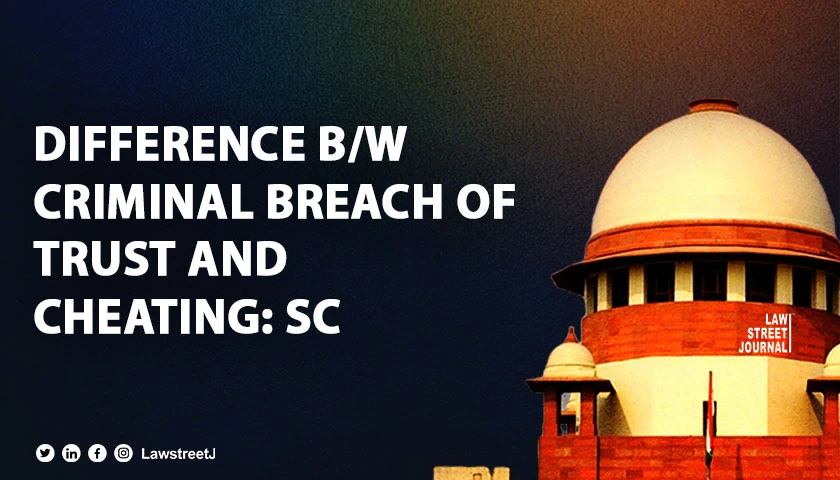NEW DELHI: The Supreme Court on Friday said it is indeed very sad to note that even after so many years of implementation of the Indian Penal Code, replaced now with the Bhartiya Nyaya Samhita, the courts have not been able to understand the fine distinction between criminal breach of trust and cheating.
A bench of Justices J B Pardiwala and Manoj Misra said unfortunately, it has become a common practice for the police officers to routinely and mechanically proceed to register an FIR for both the offences i.e. criminal breach of trust and cheating on a mere allegation of some dishonesty or fraud, without any proper application of mind.
"It is high time that the police officers across the country are imparted proper training in law so as to understand the fine distinction between the offence of cheating viz-a-viz criminal breach of trust," the bench said.
In fact, the court pointed out both the offences are independent and distinct.
"The two offences cannot coexist simultaneously in the same set of facts. They are antithetical to each other. The two provisions of the IPC (now BNS, 2023) are not twins that they cannot survive without each other," the court said.
The bench allowed a plea by Delhi Race Club (1949) Ltd and others against summons issued by Additional Chief Judicial Magistrate, Khurja, Bulandshahar against them for the offences of criminal breach of trust, cheating and criminal conspiracy.
The bench said the distinction between mere breach of contract and the offence of criminal breach of trust and cheating is a fine one. In case of cheating, the intention of the accused at the time of inducement should be looked into which may be judged by a subsequent conduct, but for this, the subsequent conduct is not the sole test. Mere breach of contract cannot give rise to a criminal prosecution for cheating unless fraudulent or dishonest intention is shown right from the beginning of the transaction i.e. the time when the offence is said to have been committed. Therefore, it is this intention, which is the gist of the offence, it added.
The court set aside the Allahabad High Court's order which declined to quash the summons issued on a complaint by Vipin Kumar Agarwal, the owner of a firm over non payment of Rs 9,11,434 for the sale of horse grains and oats over a period of time.
Referring to Section 204 of the Criminal Procedure Code, the bench said summoning of an accused in a criminal case is a serious matter. Criminal law cannot be set into motion as a matter of course. It is not that the complainant has to bring only two witnesses to support his allegations in the complaint to have the criminal law set into motion.
The order of the Magistrate summoning the accused must reflect that he has applied his mind to the facts of the case and the law applicable thereto. He has to examine the nature of allegations made in the complaint and the evidence both oral and documentary in support thereof.
It is not that the Magistrate is a silent spectator at the time of recording of preliminary evidence before summoning of the accused. The Magistrate has to carefully scrutinise the evidence brought on record and may even himself put questions to the complainant and his witnesses to elicit answers to find out the truthfulness of the allegations or otherwise and then examine if any offence is prima facie committed by all or any of the accused, the bench said.
The court opined the continuation of the criminal proceeding in the case would be nothing but abuse of the process of law.
It said the complainant should have filed a civil suit for recovery of the amount against the appellants herein, instead of having gone to the court of Additional Chief Judicial Magistrate by filing a complaint of cheating and criminal breach of trust.
The bench emphasised, "There is a distinction between criminal breach of trust and cheating. For cheating, criminal intention is necessary at the time of making a false or misleading representation i.e., since inception. In criminal breach of trust, mere proof of entrustment is sufficient. Thus, in case of criminal breach of trust, the offender is lawfully entrusted with the property, and he dishonestly misappropriated the same."
The bench said in case of sale of goods, the property passes to the purchaser from the seller when the goods are delivered. Once the property in the goods passes to the purchaser, it cannot be said that the purchaser was entrusted with the property of the seller. Without entrustment of property, there cannot be any criminal breach of trust.
"Thus, prosecution of cases on charge of criminal breach of trust, for failure to pay the consideration amount in case of sale of goods is flawed to the core. There can be civil remedy for the non-payment of the consideration amount, but no criminal case will be maintainable for it," the court said.















